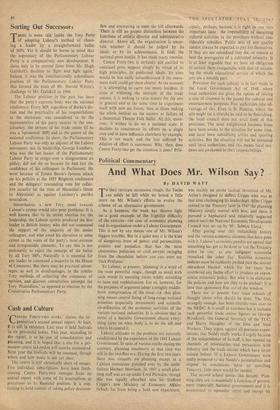Sorting Out Successors
THERE is some talk inside the Tory Party of adopting Labour's method of choos- ing a leader by a straightforward ballot of MPs. Yet it should be borne in mind that the supremacy of the Parliamentary Labour Party is a comparatively new development. It dates only in its current form from Mr. Hugh Gaitskell's decision to 'fight and fight again.' Indeed, it was the constitutionally subordinate position of the Parliamentary Labour Party that formed the basis of Mr. Harold Wilson's challenge to Mr. Gaitskell in 1960.
The Labour position in the past has been that the party's supreme body was the national conference. Every MP, regardless of Burke's dic- tum and the practicality of his responsibilities to the electorate, was considered to be the representative of his party caucus in the con- stituency, the servant of his trade union (if he was a `sponsored' MP) and in the power of the national conference. In short, the Parliamentary Labour Party was only an adjunct of the Labour movement, not its leadership. George Lansbury, who was the last leader of the Parliamentary Labour Party to resign over a disagreement on policy, did not do so because he had lost the confidence of his colleagues in Parliament. He went because of Ernest Bevin's famous attack on his policies at the 1935 Brighton conference and the delegates' resounding vote for collec- tive security (at the time of Mussolini's threat to Abyssinia) as against Lansbury's pacifist neutralism.
Nevertheless, a new Tory trend towards Labour's system would also pose problems. It is well known that in its recent election for the leadership, the Labour system produced the first leader in British history who did not command the support of the majority of his senior colleagues, and who owed his elevation to some extent to the votes of the party's most extreme and irresponsible elements. To say this is not necessarily to reject the concept of the ballot by all Tory MPs. Naturally it is essential for any leader to command a majority in the House of Commons. But there may be practical advan- tages, as well as disadvantages, in the subtler Tory methods of collecting the consensus of 'opinion, and discreet consultation amongst the Tory Traesidium,' as opposed to election by the Conservative Parliamentary Party.


































 Previous page
Previous page